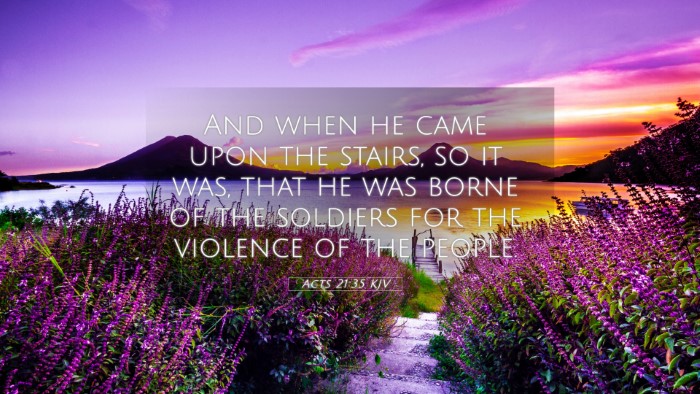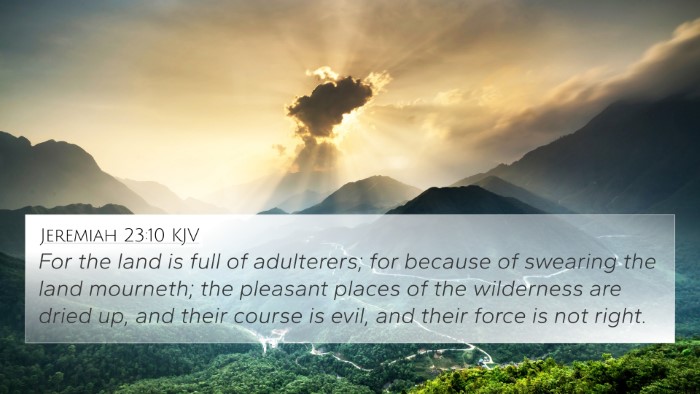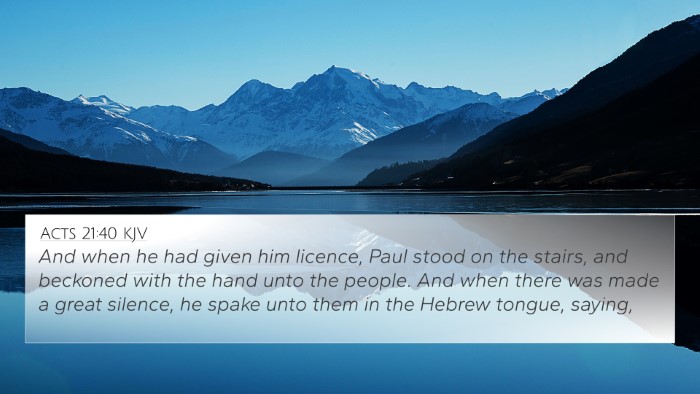Understanding Acts 21:35
Acts 21:35 states: "And when he came upon the stairs, so it was, that he was borne of the soldiers for the violence of the people." This verse provides a significant moment in the narrative of Apostle Paul's journey and reflects the circumstances surrounding his arrest and the hostility faced from the crowd. In this summary, we will explore various meanings and interpretations drawn from traditional public domain commentaries, shedding light on this biblical passage.
Contextual Background
The context of Acts 21 presents Paul returning to Jerusalem after his missionary journeys. His presence incites riots as many perceive him as a traitor to Jewish customs and laws. The situation escalates to such a degree that the Roman soldiers intervene to protect him. This underlines the tension not only between different cultural beliefs but also the role of Roman authority in maintaining order.
Commentary Insights
-
Matthew Henry's Commentary:
Matthew Henry emphasizes the theme of divine providence in the midst of trials. He interprets the soldiers’ intervention as a means of God protecting Paul, illustrating that although Paul faced severe opposition, God was overseeing his life’s mission. Henry also notes how the physical bearing of Paul by the soldiers symbolizes the spiritual strength that God provides in times of adversity.
-
Albert Barnes' Notes:
Barnes provides an analysis of the Roman soldiers' role. He highlights that their actions denote the contrast of loyalty, suggesting that even amidst chaos, there exists a level of order that must be respected. Barnes points out how this interaction speaks volumes about the protection offered to Paul and how it enables him to continue his evangelistic mission.
-
Adam Clarke's Commentary:
Clarke focuses on the nature of the crowd's violence, discussing the intense emotions that led to Paul's precarious situation. He remarks on the significance of the soldiers carrying Paul, illustrating that they act against the will of the angry mob, showcasing the complexities of human emotions juxtaposed with the steadfastness of Paul’s faith.
Thematic Links and Cross-References
This verse links closely with several other Bible passages, demonstrating the inter-Biblical dialogue that enriches our understanding of Paul's experiences. Below are key related scriptures that enhance the theme of divine protection, the challenges of ministry, and the role of civil authorities in God's plan:
- Acts 9:16: "For I will show him how much he must suffer for the sake of my name." - This verse foreshadows the trials Paul would encounter.
- 2 Corinthians 11:23-27: This passage lists Paul's sufferings, thus contextualizing the violence he faces as a part of his ministry.
- Romans 13:1: "Let every person be subject to the governing authorities." - It connects to the role of the Roman soldiers and the law.
- Philippians 1:29: "For it has been granted to you that for the sake of Christ you should not only believe in him but also suffer for his sake." - This acknowledges Paul’s calling and sufferings.
- Psalm 91:14-15: "Because he holds fast to me in love, I will deliver him; I will protect him, because he knows my name." - Speaks to God's promise of protection.
- Matthew 10:23: "When they persecute you in one town, flee to the next." - This highlights the strategy in facing opposition.
- Acts 22:25-29: This segment demonstrates Paul’s awareness of his rights as a Roman citizen, which plays a role in his testimony.
Practical Applications
In understanding Acts 21:35, we derive practical applications for our own lives:
- God’s Sovereignty: We learn that even when circumstances appear dire, God is in control and orchestrating events for our ultimate good.
- Courage in Adversity: Paul exemplifies a strong faith under pressure, encouraging believers to remain steadfast amidst challenges.
- Respect for Authority: This passage also prompts reflection on our response to civil authority and how it aligns with our faith journeys.
Conclusion
Acts 21:35 serves as a reminder of the perils faced in the mission of faith and the profound protection offered by divine providence. By analyzing this verse alongside commentary insights and thematic connections to other scriptures, we can appreciate the narrative’s depth and its implications for contemporary believers.
Related Study Tools
For further exploration and study, consider utilizing:
- Bible Concordance: A useful tool for locating specific biblical passages and themes.
- Bible Cross-Reference Guides: Tools that offer connections between verses and themes within the Scripture.
- Bible Reference Resources: Comprehensive materials that provide insights into cross-referencing and thematic links.
- Cross-Referencing Bible Study Techniques: Methods to deeply understand the interrelations of biblical texts.








